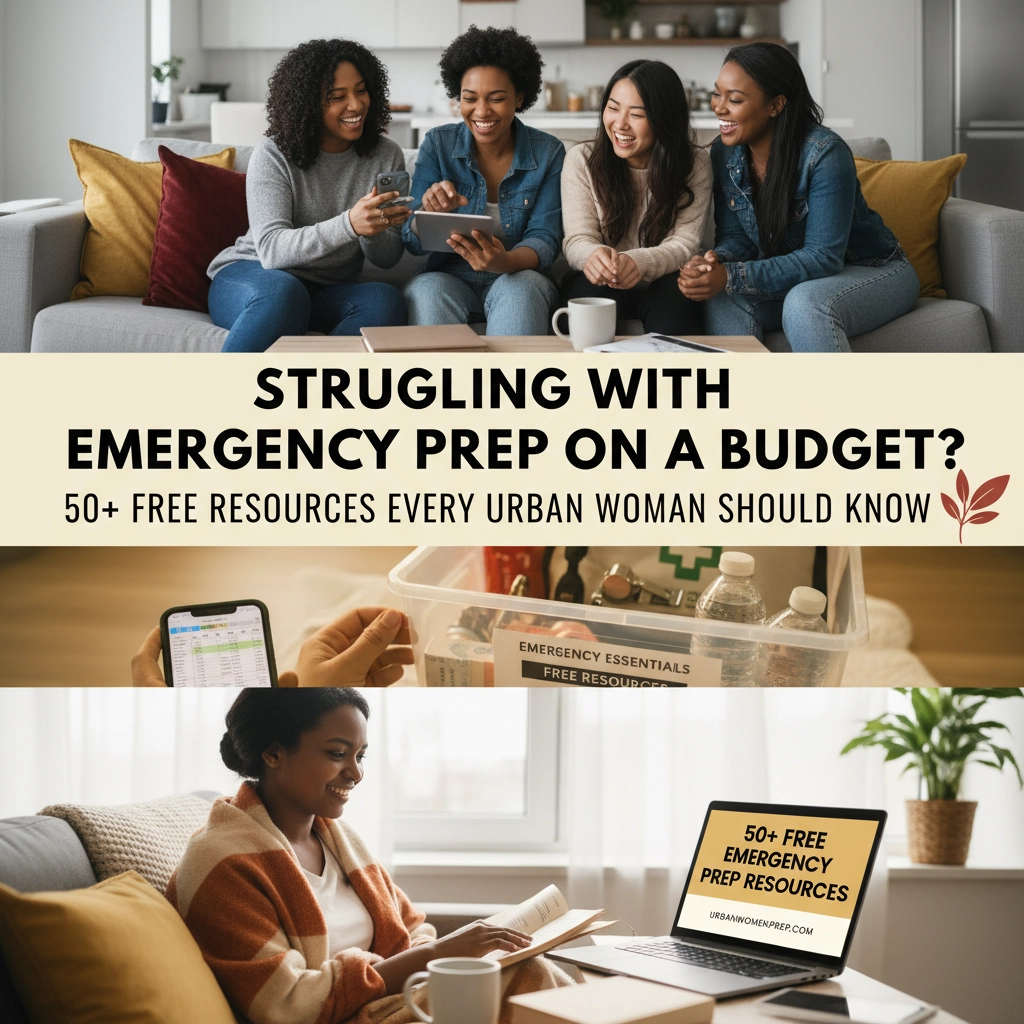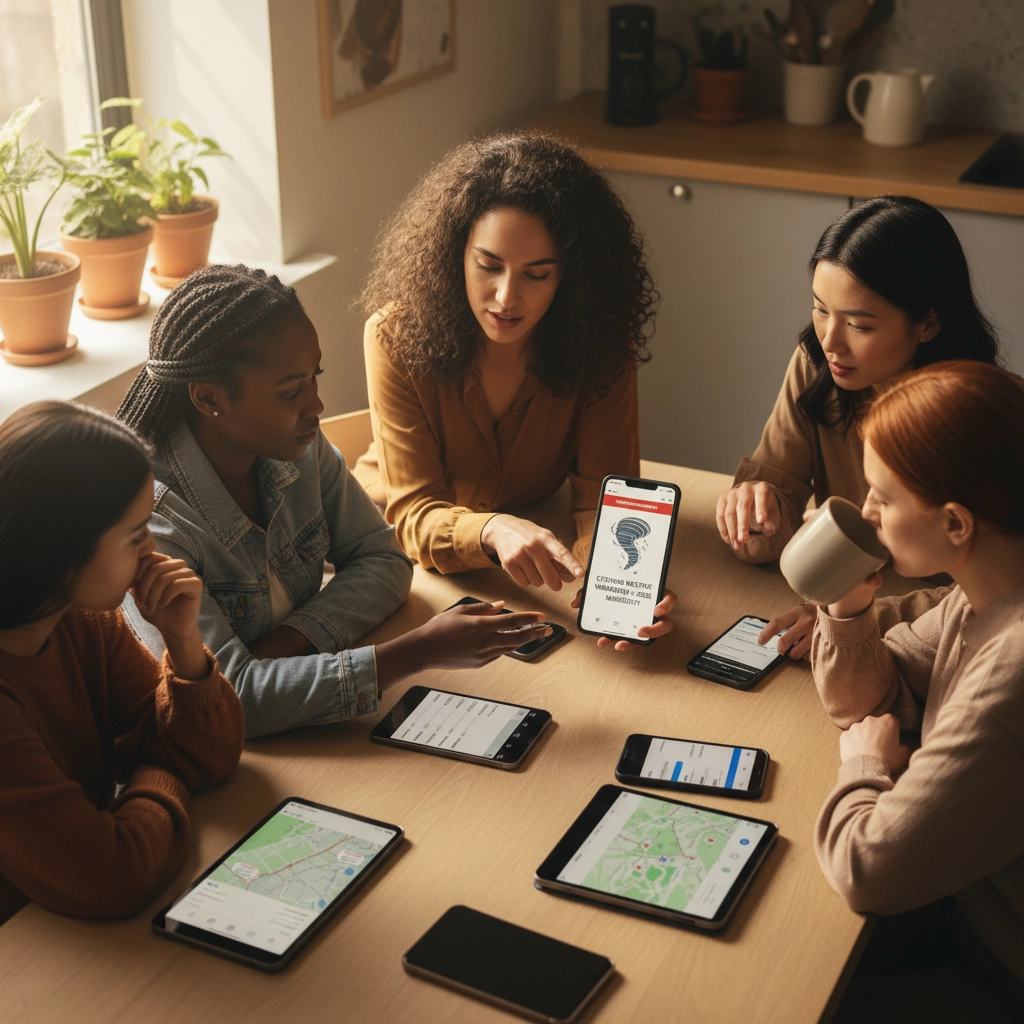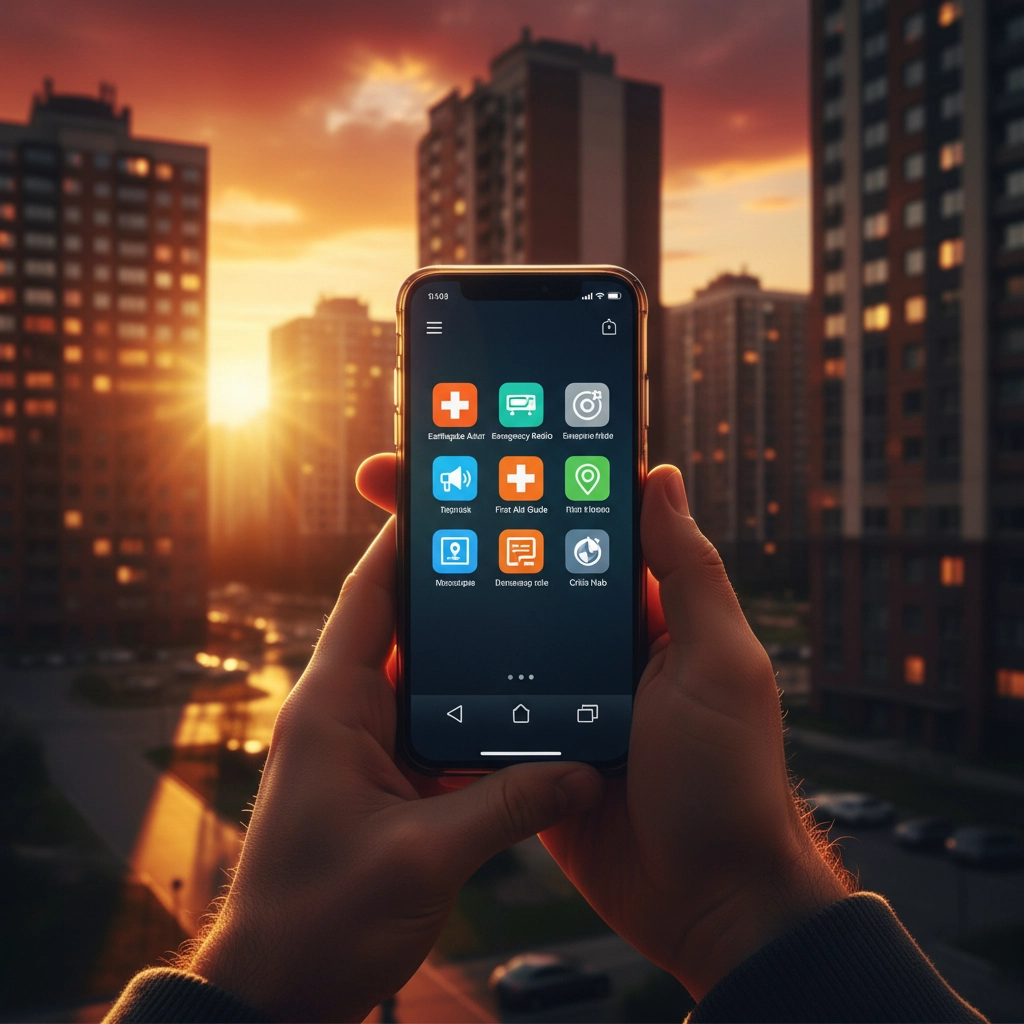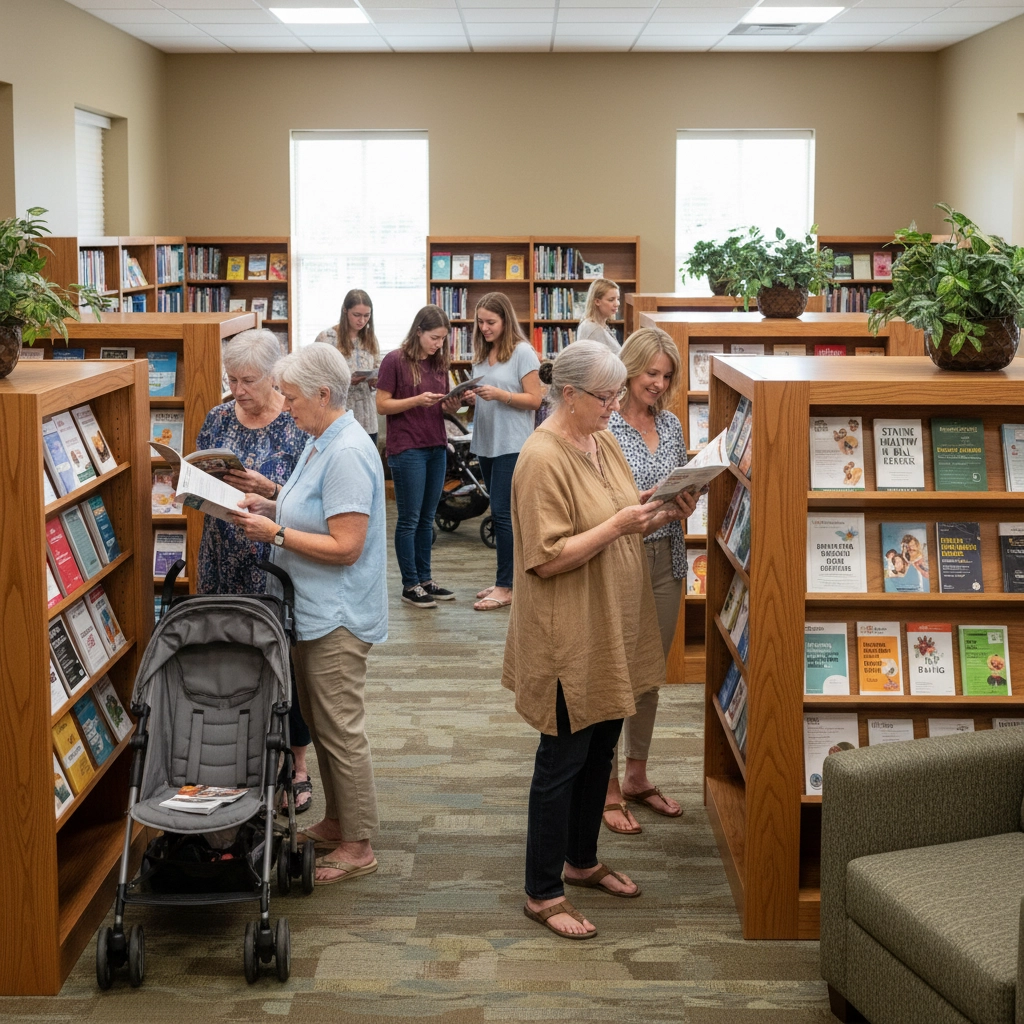
Hey, ladies! If you’re feeling overwhelmed about prepping because your budget is tighter than your favorite jeans, take a deep breath. You’re not alone, and you absolutely CAN build solid emergency preparedness without breaking the bank.
Some of the best emergency resources out there are completely free – you just need to know where to look. Whether you’re a single mom juggling everything solo or an urban woman navigating city life, I’ve got your back with over 50 incredible free resources that’ll have you feeling prepared and empowered.
Government & Official Resources (The Heavy Hitters)
Ready.gov is your best friend for emergency planning. They offer free downloadable family communication plans, emergency supply checklists, and disaster-specific guides. Everything’s available in multiple languages, too.
FEMA’s app has real-time weather alerts, emergency tips, and disaster information right on your phone.
The American Red Cross offers several apps that provide First Aid, Emergency, and Tornado information, as well as step-by-step instructions for various emergencies. They can be lifesavers (literally).
The National Weather Service (NWS) provides free weather alerts and forecasts. Sign up for wireless emergency alerts on your phone – they’re automatic and could save your life.
CDC Emergency Preparedness offers health-focused emergency planning, including medication management and special needs planning.
Your State’s Emergency Management Website has local-specific information, evacuation routes, and shelter locations. Every state has one – just search “[your state] emergency management.”
Local Emergency Management Office often provides free emergency kits at community events and offers preparedness workshops.

Apps & Digital Tools That Won’t Cost You a Dime
Zello Walkie Talkie turns your phone into a two-way radio – perfect when cell towers are down.
What3Words helps emergency responders find your exact location using just three words.
Gas Buddy shows you where to find fuel during emergencies when stations might be closed.
Nextdoor connects you with neighbors who can help during emergencies or share local updates.
Scanner Radio lets you listen to police, fire, and EMS communications in real-time.
Earthquake Alert! provides early warnings for seismic activity.
Hurricane Tracker keeps tabs on storm systems heading your way.
Flood Warning alerts you to rising water levels in your area.
Community Resources (Your Local Support Network)
Local Fire Departments often install free smoke detectors and carbon monoxide alarms. Many also offer CPR and first aid classes at no cost.
Food Banks and Pantries are goldmines for building your emergency food supply with shelf-stable items.
Community Centers frequently host emergency preparedness workshops and may distribute emergency supplies.
Local Churches and Religious Organizations often have emergency assistance programs and community response teams.
Neighborhood Watch Groups provide local security information and emergency communication networks.
Community Emergency Response Teams (CERT) offer free training in basic disaster response skills.
Habitat for Humanity ReStores sometimes have emergency supplies like flashlights and tools at heavily discounted prices.
Educational Resources (Knowledge is Power)
YouTube Emergency Prep Channels (like mine!) offer thousands of hours of free preparedness education. Search for “emergency preparedness,” “urban survival,” or “disaster planning.”
Coursera and edX have free courses on emergency management and disaster preparedness from major universities.
Local Library Programs often include preparedness workshops and have emergency preparedness books you can borrow.
University Extension Programs provide free online resources about emergency planning, food storage, and disaster recovery.
FEMA Independent Study Courses offer free certifications in emergency management topics.

Food & Water Resources
WIC and SNAP Programs can help you build food security, which is essential for emergency preparedness. While these programs have been cut, you may be eligible until they take effect. Don’t let pride take food out of your family’s mouths!
Local Water Departments often provide free water quality reports and emergency water storage guidelines.
Community Gardens can supplement your food storage and provide fresh produce during extended emergencies, while also teaching you how to grow your own. Even if you’re not ready to plant, see if volunteering your time to help may get you some freebies.
Gleaning Programs let you harvest excess produce from farms and orchards for free.
Food Recovery Networks redistribute surplus food from grocery stores and restaurants.
School Meal Programs ensure your kids have access to nutrition during extended emergencies when schools are closed.
Health & Medical Resources
Community Health Centers often provide free or low-cost medical care and can help you prepare medical emergency kits.
Local Pharmacies sometimes offer medication synchronization services to help you maintain a steady supply of emergency medications.
211 (Dial 2-1-1) connects you to local health and human services, including mental health crisis resources.
Crisis Text Line (Text HOME to 741741) provides 24/7 mental health support during emergencies.
Local Health Department offers free health emergency planning resources and vaccination clinics.
Medical Reserve Corps provides volunteer medical support during disasters and often needs community members.
Financial Resources & Assistance
LIHEAP (Low Income Home Energy Assistance Program) helps with heating and cooling costs, reducing your monthly expenses so you can invest in preparedness.
Weatherization Assistance Programs make your home more energy-efficient for free, helping with both monthly bills and emergency heating/cooling.
Local Utility Companies often offer budget billing and assistance programs that can free up funds for emergency supplies.
Credit Unions frequently offer emergency loans at low interest rates if you need quick access to preparedness funds.
Community Action Agencies offer various assistance programs that can help free up funds for emergency preparedness.

Communication & Alert Systems
Wireless Emergency Alerts (WEA) are automatically sent to your phone and don’t require sign-up.
NOAA Weather Radio broadcasts can be accessed through weather apps or an inexpensive weather radio.
Local Government Social Media Pages provide real-time emergency updates and information.
Amber Alert systems keep you informed about child abduction emergencies in your area.
Emergency Alert System (EAS) broadcasts through radio and TV during major emergencies.
Community Facebook Groups offer hyperlocal emergency information and neighbor-to-neighbor assistance.
Safety & Security Resources
Local Fire Departments can offer preparedness advice, and may know (or even host) CPR/First Aid Classes
Local Police Departments often offer free home security assessments and personal safety classes.
Domestic Violence Shelters have emergency planning resources even if you’re not currently in danger – they understand crisis planning.
College Campus Security (if you’re a student) provides emergency planning and response resources.
Workplace Emergency Plans – make sure you understand your employer’s emergency procedures.
Storage & Organization (Making the Most of What You Have)
Pinterest and Instagram are treasure troves of DIY storage solutions for small spaces.
FreeCycle and Buy Nothing Groups on Facebook help you find free containers and storage solutions.
Apartment Complex Resources – many have emergency procedures and sometimes provide emergency supplies.
Storage Unit Facilities occasionally offer first month free, which could help if you need temporary expanded storage space.
You can also review my earlier articles on storage solutions here and here.
Building Your Network
The most valuable resource? Your community. Start conversations with neighbors about emergency planning. You’ll be amazed how many people want to help each other prepare but just don’t know how to start.
Remember, emergency preparedness isn’t about buying your way to safety – it’s about planning, knowledge, and community connections. Every single one of these resources represents someone or some organization that wants to help you succeed.
You don’t need a huge budget to be prepared. You just need to know where to look and be willing to start somewhere. Pick three resources from this list today and explore them. Next week, try three more. Before you know it, you’ll have built a comprehensive emergency preparedness plan without spending a fortune.
Ready to dive deeper into emergency preparedness? Check out our latest podcast episode where we break down more budget-friendly prep strategies, and don’t forget to grab our free prepper checklist to get started today! the password is StayReady 🙂


